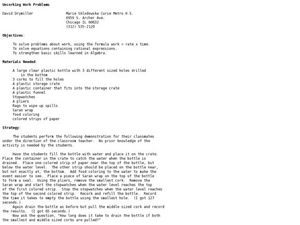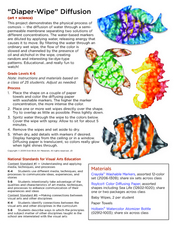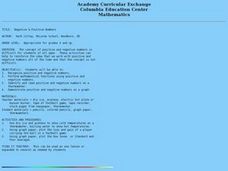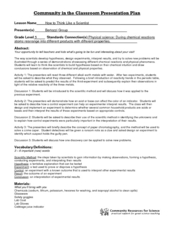Curated OER
Uncorking Work Problems
Explore the concept of work with your class, using bottles, water, and corks to calculate work, while using the formula work = rate x time. Middle schoolers conduct multiple experiments, timing how long it takes for water to drain out of...
Curated OER
Diaper-Wipe Diffusion
Explore osmosis through art. Learners use paper towels and markers to create beautiful designs. Although a simple activity, the results are quite remarkable. Your class will love this lesson!
Oregon Museum of Science and Industry (OMSI)
DNA Extraction
What does your DNA actually look like? Use simple materials with this experiment to find out! Geneticists of all ages can follow these instructions to extract their own DNA. For learners who are hoping to extend the activity, there are...
Curated OER
Monochromatic Painting
Students experiment and create an original monochromatic painting. They define tint, monochromatic, and shade. They analyze their paintings objectively and determine the connection between color and emotion.
Curated OER
Paper Clay Fish Sculpture
Why not get creative and use paper clay to create colorful fish sculptures? All the steps needed to complete this activity are included. Your class will sculpt beautiful fish while exploring color, shape, and creative thinking. Use these...
Curated OER
Wildlife
The centerpiece of this lesson plan is a predator-prey simulation in which colored paperclips represent different species of animals camouflaged against a colored background. Relevant follow-up questions are provided. The activity is...
Carnegie Mellon University
Bathtub Model
Using a colorful infographic handout and a guide sheet, hold a class discussion about how a bathtub can serve as a model for the greenhouse effect created by Earth's atmosphere. Participants will understand that as energy or matter is...
Curated OER
Who Lives with Mallard?
Students color a picture of the habitat featuring mallard and other creatures, some of whom might be camouflaged or half-hidden. They discuss other forms of animal adaptation.
Curated OER
Malta: The Landscape
Students work in small groups to create a topographic map of Malta. They must include labeled line drawings of bordering countries and bodies of water. Students use salt and flour clay to make Malta three dimensional, showing the nearest...
Curated OER
Making a Thermometer
Students observe a demonstration of how a thermometer functions. They apply the scientific method while determining which of three cups hold the coldest water. They write a hypothesis before conducting the experiment and gather data.
Curated OER
Mapping Ancient Coastlines
Most of this lesson plan is spent working on the "Bathymetry Worksheet." It includes a graph of the changes in sea level over the past 150,000 years and a bathymetric map of changes in an imaginary coastline over time. Participants...
Curated OER
The Magma Also Rises
Convection is thoroughly demonstrated using a model of Earth's mantle. Detailed background information is provided for the teacher, as well as a list of materials. Although a colorful and detailed worksheet is available for the class,...
Curated OER
Soil Scrolls
Third graders examine soil samples and explore the what happens in each layer of the subsoil. They work in cooperative groups to create a scroll that shows what takes place in each layer, and discuss why much of the activity is in the...
Curated OER
Creature Painting
Kids create a free-form art piece using paper, water-based paints, markers, and imagination. They allow the paints to randomly bleed, mix, and move on the paper, then they look for forms in the organic images. They black-line the shapes...
Curated OER
The Ocean Floor and Shore Zones
Make textbook reading more engaging using this reading activities learning exercise, through which scholars review major features found on the ocean floor and the processes that formed these features. They complete 11 terms in a...
Curated OER
Land or Sea?
Sixth graders access a database to search for desired information, using "and" or "or" connectors where necessary. They choose a connector and search a prepared database of European countries to locate which countries border certain...
Curated OER
Negative and Positive Numbers
Help scholars explain the concept of positive and negative numbers. Here you will find three separate activities that will help them to correlate positive and negative numbers with real life. Note: Activities require that the teacher...
Curated OER
Dinosaurs
Students are introduced to the various types of dinosaurs and write in their journals about their favorite one. After listening to a story and watching a filmstrip, they color a few pages in their Dinosaur Friends Book. They also examine...
Curated OER
Periodic Table of the Elements
First graders discuss, at their level, the concept of elements making up all matter. They discover the story of Dimitri Mendeleev and his discovery of the Periodic Table of the Elements. They locate and color some of the most common...
Curated OER
How to Think Like a Scientist
Fifth graders study the scientific method and understand how to apply it. In this "thinking like a scientist" lesson students complete several activities.
Curated OER
Narrative Cartoons
Students create narrative cartoons based on the activities of the Peace Corps. For this narrative cartoons lesson plan, students create comic strips where they draw and write about various activities that the Peace Corps is involved in.
Pleasant Valley Community School District
Integumentary System
This document can be used as a slide show to introduce your human body systems class to the integumentary system, also know as skin. Topics outlined include the roles of skin, details about its its layers, and color (cause and...
Desert Discoveries
Creating a Garden Journal
Youngsters create science journals which are used to record observations from the school garden. The goal of this activity is to help kids tune into nature by making daily observations on the growth of the plants, and also to take note...
Curated OER
At the Crayon Factory: high frequency and spelling words
After reading the story At The Crayon Factory learners complete 4 different language arts activities. They write spelling and high frequency words, fill in the blanks to sentences, answer short answer questions, and write sentences.

























